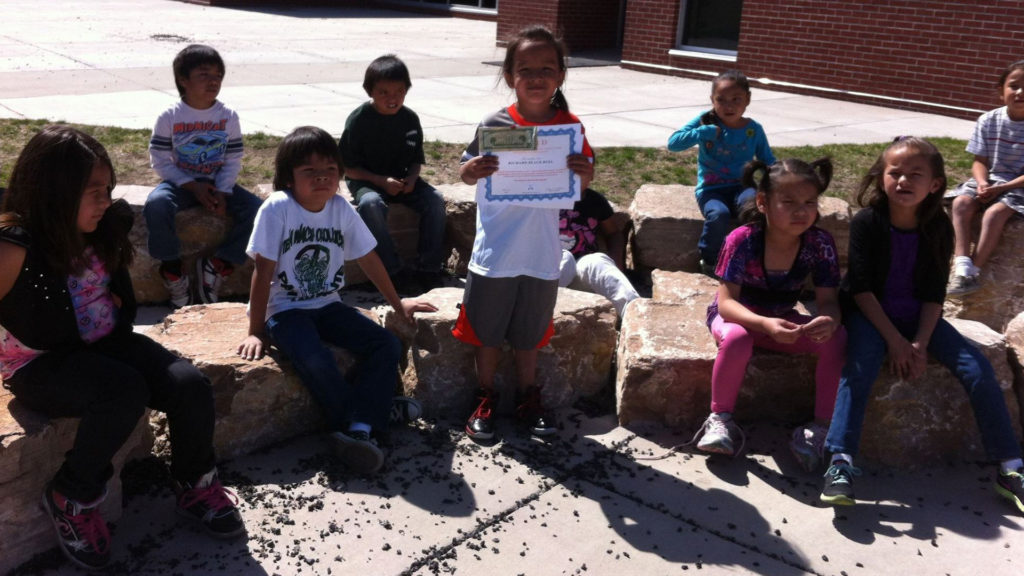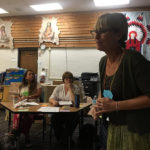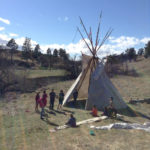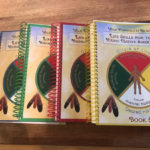Everyone’s seen the statistics about the Pine Ridge Reservation as it is one of the poorest and least developed areas in the country with widespread unemployment, health problems, and addiction. Aside from Haiti, the reservation has the lowest life expectancy in the western hemisphere, a stark contrast to other communities in the Black Hills. When getting lost in these numbers, it can be easy to feel helpless about helping the children on the reservation lead a better life.
Cindy Catches has lived on the reservation for close to 30 years and has seen first-hand the struggles these children face. It can be hard to avoid addiction, be healthy, and focus in school when their home lives are amiss. It is difficult for her and her husband, a 38th generation Lakota medicine man, to see the Lakota language and culture fade out in younger generations. Oceti Wakan (meaning ‘sacred fireplace’) is a nonprofit organization founded by her husband and his father, Pete S. Catches Sr., a 37th generation medicine man, to address the culture, language loss, and healing of their people. Cindy joined the organization in the early 1990s. They created teaching materials from scratch for life skills, the language, and Lakota culture.
Cindy spends much of her time working on more materials in her office. The room is lined with sage shaped into circles from the many sundances her husband has conducted, and the shelves are stuffed full of workbooks she has authored about life skills for young Lakota kids and learning the Lakota language.
Oceti Wakan’s life skills class was implemented at Wolf Creek School in Pine Ridge for the first time and after hearing about the success, other reservation schools are lined up to start using the program. It is important to start the material in elementary schools, as kids need to learn life skills before they get sucked into the cycle of addiction.
“It is hard to fix someone once they have a disease, whether that disease is addiction, diabetes, or cancer. It is much easier to give children the prevention tools to make healthier choices than to deal with it after the problems have took root,” she said.
The classes teach about developing healthy relationships, being positive, nutrition, exercise, trauma, understanding the nature of addiction, avoiding codependency, and mantras for positive reinforcement — all in a Lakota context.
Pete Catches said that the Black Hills gave the Lakota people seven medicines and one of them was water, so the program includes a lesson about the importance of drinking water instead of unhealthy sugary drinks. Another lesson is about the second medicine given to the people, food, and how that food needs to be healthy in order to avoid future health problems like diabetes.
In the life skills class, traditional Lakota stories are told and children must analyze the stories and identify the virtues of the characters. Some of the stories are fun, like the ones about a trickster spider called Iktomi. Others deal with serious issues that children face, like one story that tells of a native woman’s struggle to come to terms with trauma from her past.
“The foundation of the course is that we have to give the kids back to who they are as Lakota,” said Cindy. “We have collected over 200 traditional Lakota oral stories and created map worksheets to go along with the stories. Traditionally, these stories were used to teach children what was important in life.”
The worksheets ask questions like “What virtue does this story teach?”, “What emotions were displayed in the story?,” and “What does it teach about problem solving?”
“The stories of Iktomi talk about how we each have an animal nature and a spirit nature, so we’re always at battle with our animal nature. Iktomi teaches that greed and selfishness are natural in an animal but those characteristics are something we have to conquer as human beings,” Cindy explained.
Her philosophy of helping children on the reservation avoid the many pitfalls they face, is to deal with what she called “intergenerational trauma.” After being sectioned off into reservations, Lakota children were taken away from their families, put in boarding schools, cut their hair (something that was embarrassing at the time in native culture), prevented them from practicing their religion or ceremonies, and forced them to speak English to integrate them into white society. According to Cindy, this was the start of a cycle of trauma that is persistent as so many healthy parenting tools were lost as the children were only able to come home two months out of a year.
“When there is a lot of trauma and hurt in the community and family, people try to self medicate the pain that they feel,” she explained. “We try to help them break out of that cycle of addiction and abuse. We have also created a “Parent’s Handbook’ with healthy parenting tools, because children learn from what they see and often what they see isn’t good.”
When there is an addict in the family, Cindy explained, the hurt and pain is extended to the children. The children never want their parents to drink but because of the addict’s behavior, they can never express how they’re feeling. Children have been stuffing their feelings away for so long that they have trouble identifying and dealing with their emotions. This is why every lesson starts with students sharing how they are feeling in the moment, as this helps them identify their feelings.
“By the middle of the school year, the students have really bonded with each other. We began teaching meditation to help deal with negative emotions. Initially, they weren’t into it but by the end, they wanted to meditate more because it helped them sit more comfortably with their feelings. There is a lot of trauma that goes on in their homes, so we always start with a trauma exercise, whether meditation, sharing feelings, or journaling.”
While there is a long way to go, the children in the classes have shown significant growth.
“We asked teachers how much of the material were the kids actually retaining, and the teachers thought they had retained close to 60% of the information, because we taught the concept and then gave activities that help integrated the concept,” Cindy recalled. “The real proof is how much the kids were applying the knowledge to their lives. We asked the teachers this as well, and they said that about 40% of the kids were using the tools they were taught. Each year, we project this number to grow.”
Whether teaching the native language or the importance of healthy eating, Oceti Wakan is paving the way for a brighter future in Pine Ridge. The success of the life skills program is only the beginning for this nonprofit.
—-
Oceti Wakan was founded by Cindy’s father-in-law, Peter S. Catches Sr. (Petaga Yuha Mani), a 37th generation medicine man and author who founded the Spotted Eagle Sundance which is the longest running sundance in Lakota country.
Their first project was over a decade ago when they conducted a reservation-wide survey about the health of the Lakota language. Since then, they have developed six language books and CDs, as well as language learning stations at some of the local schools.
See how you can get involved by visiting their website: ocetiwakan.org.
By Kelsey Sinclair




